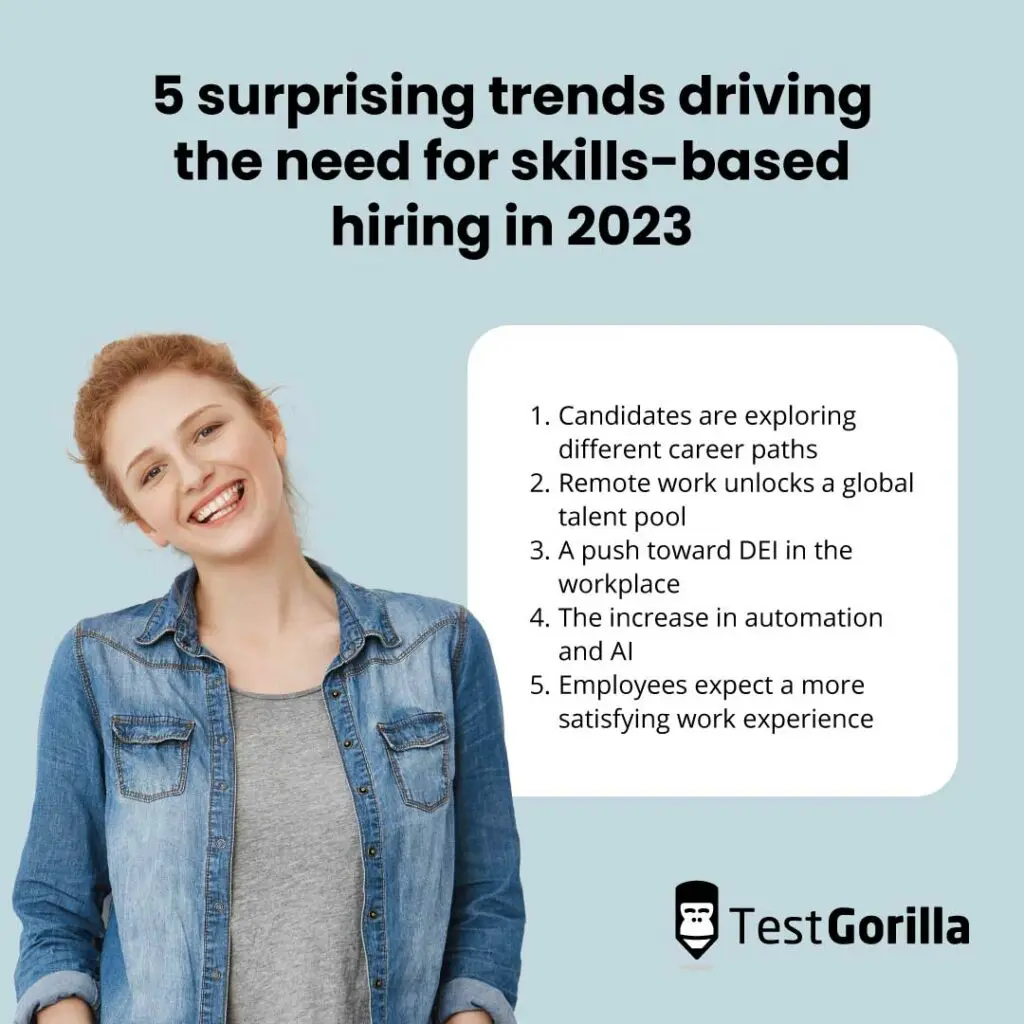Resumes are the catfish of the recruitment world.
Resumes that only reveal career and academic background are dressed up to make the candidate look like your ideal match. But they aren’t actual indicators that a candidate will be successful in that role. Simply put, resumes risk overinflating a candidate’s potential.
Luckily for you, skills-based recruitment reveals the best candidates for job openings with tests and data, leaving behind bias and distractingly shiny resumes.
Skills-based recruitment doesn’t just catfish-proof your hiring process. In a world where hiring is getting harder, this hiring strategy will keep your recruitment team one step ahead.
Read on to find out about five trends that will affect your ability to hire top talent in 2023.
Table of contents
- 1. Candidates are exploring different career paths
- 2. Remote work unlocks a global talent pool
- 3. A push toward DEI in the workplace
- 4. The increase in automation and AI
- 5. Employees expect a more satisfying work experience
- Skills-based assessments bridge the gap between quality hires and successful recruitment
1. Candidates are exploring different career paths
The year 2023 will be the year candidates start to explore career changes. With shifts in work models and mass layoffs in tech-related businesses, candidates are curious about new job roles and alternative careers that match their strongest skills over their past experience and academic background.
The recruitment industry needs to be comfortable with the notion that careers are no longer linear. The pandemic brought new working dynamics to the forefront, with companies changing their procedures to accommodate new technologies. This also meant the introduction of hybrid and remote-work setups. Such flexibility and redefinition of job roles allow employers to rethink their career and job options with more choices than before.
New technologies and roles have allowed candidates to explore career options that complement their favorite skills. And if location isn’t a hiring criterion anymore, employers can find amazing talent who don’t necessarily have direct experience in a role but whose skills will make them a perfect fit.
New technology and a hybrid work environment no longer make career development a continuous upward climb. Instead, it’s different pools of experience for each job skill, with each one giving candidates a sense of purpose and adaptation to technology needs.
For example, let’s imagine the career choices of a developer. Inherently, developers are great at building software or hardware, but they also have skills in management and teamwork. Naturally, they could choose to pursue a position as a “lead developer.” Or a developer with great management skills might find more purpose in pursuing a role as a product manager. This change in career can be because the developer has more interest in management and teamwork than spending time developing products.
Therefore, it makes sense to evaluate candidates based on their skills, not on their past roles. The skills they’ve learned are the real test of whether they’ll be successful in a new role, not the past experience that might have required now outdated skills and experience.
2. Remote work unlocks a global talent pool
Remote work opportunities empower candidates to apply for jobs outside geographical borders. For companies, this is great news – your candidate pool just got bigger.
Candidates can apply for their dream jobs in fields that fit their skill sets around the world instead of only at companies in their area. But this also comes with its challenges. How do you effectively assess global talent?
The increase in the number of applications from overseas has opened the door to new kinds of unconscious recruitment biases. Hiring managers are faced with universities, companies, and languages that are unfamiliar to them.
Remote work demands a change in recruitment tactics. The global talent pool comes with new backgrounds and strong skill sets, but they don’t fit into the same nest boxes hiring managers may be used to. As such, hiring managers need to rethink their approach to target the skills of each individual.
With skills-based hiring, recruiters can focus on the best talent, regardless of a candidate’s education or work experience. Skills assessments pull out the best talent, regardless of their background or bias.
For example, let’s say you’re hiring for a data science position. Two candidates apply, each with similar experience. However, one of them has work experience at your previous company, while the other has worked for an overseas company you’ve never heard of.
Both are great candidates, but you know the first candidate has the skills they need from their previous company. What about the second candidate? Using a skills-based test, you can assess their reporting and forecasting skills, giving you a more detailed and educated understanding of which candidate will succeed in the role.
As Wouter Durville, co-founder and chief executive of TestGorilla, puts it, “Your applicant pool is much bigger if you give everyone a fair chance, and the best talent comes out on top regardless of its background and your unconscious biases, so it’s logical that you’ll hire better candidates.”
3. A push toward DEI in the workplace
There’s a huge push toward diversity, equity, and inclusion (DEI) in the workplace, which is led by a large part of the workforce and social action. In fact, when a company nurtures an inclusive culture, 83% of millennials are engaged, as opposed to only 60% of millennials who work for companies without an inclusive culture.
Social awareness and the rise of accountability have pushed companies to proactively create a diverse and inclusive workforce. Notably, 80% of job seekers agree DEI impacts their company choice. Just like with remote work, a greater emphasis on DEI means a more diverse pool of candidates – if you make inclusion a priority in recruitment from the very beginning.
Studies have proven that bias in recruitment exists, even for businesses that uphold DEI in their values. That’s because traditional, resume-based hiring is already prone to bias. For example, one study found that Black candidates increased their callbacks by 25% if they whitened their resumes by changing their names or hobbies to “typical” White-associated pastimes. And Asians increased callbacks by 21%, even if their qualifications and experience were identical.
Bias leads to high barriers to employment for applicants of certain backgrounds or identities. The hiring script needs to shift to nurture diversity, but this can’t happen with resume-based hiring. Recruiters need to push skills-based hiring methods to eliminate bias.
Instead of judging applicants by their backgrounds, skills-based hiring assesses candidates by what skills they bring to the table, leveling the playing field.
For example, skills-based hiring eliminates the unconscious bias recruiters might have toward a candidate that has gone to a lesser-known university. Skills-based tests show a candidate’s specific abilities in the skills and knowledge they need for the job rather than relying on the name of their university to “assess” their potential.
Thanks to its ability to push past bias, it’s no surprise that over 97% of businesses surveyed say skills-based hiring increases workplace diversity.
As Wouter Durville says, “Since [skills-based hiring] changes the way you source and select candidates, it makes diversity possible in the workplace.”
4. The increase in automation and AI
The rise of AI tools and technology is changing job roles. With the increase of automation, the most successful candidates will be those with the ability to use technology.
Technology plays a huge role in the workforce. It has changed how employees communicate, organize, and implement the job skills they’ve learned throughout their careers.
Skills learned in university over five years ago are outdated, as technology has brought about new information, new tools, and new jobs. Tech moves fast, and the successful employees will be those that are able to adapt and enhance their skills using technology.
Recruiters need to shift their focus from outdated university degrees and instead narrow in on the candidate’s ability to adapt their skills. This is important since with new technology comes new data, strategies, and revenue opportunities, so you definitely want to hire a candidate with the latest insights and tech knowledge to optimize the role’s productivity.
Skills-based hiring screens candidates on the skills that are relevant to the technology standards of their industry.
For example, imagine you are hiring a sales representative for your company. The best candidate won’t necessarily be the candidate with 15 years of sales experience. The most suitable candidate will be the one with proven results using sales CRM platforms. This is because the new selling landscape leverages technology to continuously nurture and improve the sales pipeline’s health.
Of course, with the rise of automation and technology, recruiters can’t solely base their decision on how well a candidate uses technology. There’s another critical element too – soft skills.
Recruiters must focus on assessing candidates who have strong soft skills that computers can’t mimic. Soft skills, like creativity, communication, critical thinking, and teamwork, are valuable skills that improve a team’s performance and productivity.
For example, with the rise of AI writing tools like Writer, content writers can automate the blog writing process. However, the ideas, examples, and statistics for each blog still need to come from a human with creative and critical-thinking skills in order for a blog to be helpful and engaging to the reader.
5. Employees expect a more satisfying work experience
Dynamics between employers and employees have changed a lot since 2020. Now, employees are shifting to value a flexible lifestyle and work-life balance. This has also shifted their expectations for how they feel about their workplace.
An employee’s experience working for your company influences the rate of employee engagement and retention. In the era of “quiet quitting,” where 77% of employees experience burnout, employees won’t stick around and wait for a company to fix its culture. Now, candidates can look for jobs that fit their values, career development goals, and cultural needs.
In fact, 72% of employees hired through skills-based recruitment consider themselves happy and supported, compared to 63% of those recruited via other methods. Our research shows that skills-based hiring is already a preferred method of assessment for the majority of workers. Switching to skills-based hiring can improve the overall employee experience and impressions of the company.
By using skills-based hiring, you ensure your employees feel fulfilled in their daily tasks and empowered by their work skills. This is partially due to skills-based hiring allowing potential candidates to have a peek at what their day-to-day work tasks would resemble. It also empowers current employees to progress in their positions based on skills, not years in a company, which supports employee career goals.
With such clarity, candidates applying for a role won’t experience surprises the day they get hired, as they’ll know exactly what their tasks will cover and be able to judge if the role will fit their career goals and lifestyle.
And, for employees who want to feel supported in their career progression, skills-based hiring means companies can recruit internally by assessing employees’ skills instead of the amount of time they’ve been in their roles.
Skills-based assessments bridge the gap between quality hires and successful recruitment
Skills-based recruitment gives both the employer and the candidate complete transparency into the skills and knowledge required for a role. This gives companies the confidence to move candidates along the recruitment funnel, while also showing candidates what their day-to-day tasks would resemble.
In addition, skills-based recruitment reduces discrimination caused by unconscious biases. Instead, it uses the candidate’s ability to perform a skill needed in their potential role in a company, regardless of career and educational background.
Recruiting quality hires will impact your company’s culture, revenue, and growth. If you’re curious about learning how our platform can help you reach your recruitment goals, try TestGorilla for free.
Related posts
Hire the best candidates with TestGorilla
Create pre-employment assessments in minutes to screen candidates, save time, and hire the best talent.
Latest posts
The best advice in pre-employment testing, in your inbox.
No spam. Unsubscribe at any time.

Hire the best. No bias. No stress.
Our screening tests identify the best candidates and make your hiring decisions faster, easier, and bias-free.
Free resources
This checklist covers key features you should look for when choosing a skills testing platform
This resource will help you develop an onboarding checklist for new hires.
How to assess your candidates' attention to detail.
Learn how to get human resources certified through HRCI or SHRM.
Learn how you can improve the level of talent at your company.
Learn how CapitalT reduced hiring bias with online skills assessments.
Learn how to make the resume process more efficient and more effective.
Improve your hiring strategy with these 7 critical recruitment metrics.
Learn how Sukhi decreased time spent reviewing resumes by 83%!
Hire more efficiently with these hacks that 99% of recruiters aren't using.
Make a business case for diversity and inclusion initiatives with this data.


















